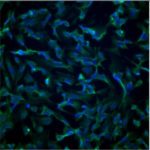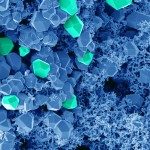Présentation
Projets Transversaux
Projets
Anciennes Équipes
CV
Dr. Paola B. Arimondo works at the interface of Chemistry and Biology and develop original chemical tools able (i) to elucidate, at the molecular level, the biological mechanisms that are aberrant in human diseases and (ii) to target these mechanisms aiming at novel therapeutic strategies. She studied Chemistry at the University of Pisa (Scuola Normale Superiore, Italy) and received her Ph.D in Biophysics at the MNHN in Paris. In October 2001, Paola Arimondo was recruited by the CNRS in Paris. Her research focused on the interactions between nucleic acids and proteins and their modulation by small chemical molecules. Initially she developed a strategy to target at a specific DNA site a class of antitumor agents directed against human DNA topoisomerases I and II, resulting in site-specific “DNA scissors”. The strategy was patented and developed in collaboration with a pharmaceutical company, Sigma Tau, Italy. After a six-month sabbatical in 2005 at the University of California in Berkeley, she initiated a new project developing an innovative antitumor strategy aiming at the epigenetic control of gene expression in cancers. In 2011, Paola Arimondo was recruited to lead the Laboratory of Epigenetic Targeting of Cancer (ETaC) USR3388, a joint public-private Laboratory between the CNRS and Pierre Fabre Laboratories, in Toulouse, France. ETaC research projects spanned from the chemistry of the natural products to the discovery of chemical modulators of DNA methylation in cancer. Under her leadership the ETaC laboratory in Toulouse has discovered novel potential drugs and biomarkers. In 2016-2017 she was Oversea Fellow of the Churchill College, Cambridge, UK. In January 2018 she start a new Research Unit Epigenetic Chemical Biology (EpiChBio) at the Institut Pasteur dedicated to the design and use of novel chemical tools to study the molecular mechanisms underlying the aberrant methylation in cancer cells towards a better understanding of the disease and how to target it. The Institut Pasteur offers a unique integrated research frame from microbiology to cancer, from chemistry, structural biology to cellular biology and in vivo experiments. The chemical tools I develop will bring an alternative approach to address the biological questions and, in return, their knowledge and expertise in biology will be a certain asset for our research.
Publications
Télécharger-
2025In Quest of Chemical Probes for DNA Methylation Reader Proteins: Nucleoside and Dimer Analogues of 5‐Methylcytosine Interact with MBD2, Angewandte Chemie International Edition, In press, pp.e202425599. ⟨10.1002/anie.202425599⟩.
-
2025Pioneering first-in-class HDAC-ROCK inhibitors as potential multitarget anticancer agents, Taylor&Francis Online .
-
20253-Halo-3-nitro-aza/thioflavanones: DNMT inhibitors with a two-site binding mode in the hDNMT3A catalytic pocket3-Halo-3-nitro-aza/thioflavanones: DNMT inhibitors with a two-site binding mode in the hDNMT3A catalytic pocket, BioOrg. Med Chem. .
-
2025Design, Synthesis and Evaluation of Pyrimidinobenzylamide and Pyrimidinothiophenamide Derivatives as Inhibitors of DOT1L and Related Epigenetic Targets DNMT3a, PRMT4 and other HMTs, RSC Medicinal Chemistry, .
-
2024High Content Screening Assay of Inhibitors of the Legionella Pneumophila Histone Methyltransferase RomA in Infected Cells., Chembiochem 2024 Dec; 25(23): e202400293.
-
2024Supercomputer-based virtual screening for DNMT1 inhibitors as novel anticancer agents, Int. J. Mol. Sci..
-
2024Adenine, a key player in biology and medicinal chemistry , Comptes Rendus Chimie, Académie des Sciences .
-
2024Non-canonical functions of UHRF1 maintain DNA methylation homeostasis in cancer cells, Nature communication.
-
2024Tunable DNMT1 degradation reveals DNMT1/DNMT3B synergy in DNA methylation and genome organization., J Cell Biol 2024 Apr; 223(4): .
-
2023DAXX safeguards heterochromatin formation in embryonic stem cells, J Cell Sci. 2023 Sep 1:jcs.261092. doi: 10.1242/jcs.261092. Epub ahead of print. PMID: 37655670..
-
+Voir la liste complète de publications








